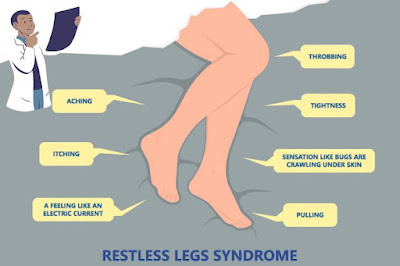There is some evidence that certain vitamins and minerals may help alleviate symptoms of restless leg syndrome (RLS).
What vitamins help restless leg syndrome
These include,
1. Iron:
Low iron levels in the blood have been
linked to RLS, so taking an iron supplement may be beneficial for some
individuals.
2. Magnesium:
Magnesium is a mineral that is
important for muscle and nerve function, and low levels of magnesium have been
associated with RLS.
3. Folic
acid:
Folic acid is a B vitamin (1) that has
been found to improve symptoms of RLS.
4. Vitamin
D:
Some studies have suggested that low
levels of vitamin D may be associated with RLS, and taking a vitamin D
supplement may help alleviate symptoms.
Read:
Korean
skin care for eczema
How to stop restless legs immediately?
There are several home remedies for
restless legs that may help symptoms of restless leg syndrome (RLS),
1. Exercise:
Regular physical activity can help
improve blood flow, reduce muscle tension and promote relaxation, which may
help alleviate symptoms of RLS.
2. Hot
and cold therapy:
Applying a heating pad or taking a
warm bath before bed can help relax the muscles, while an ice pack or cold
compress can help reduce inflammation and discomfort.
3. Massage:
Gentle massage of the legs may help
relax the muscles and reduce discomfort.
4. Stretching:
Gentle stretching exercises,
particularly for the legs, may help relax the muscles and reduce discomfort.
5. Good
Sleep hygiene:
Establishing a regular sleep schedule
and maintaining a comfortable sleep environment can help promote restful sleep
and reduce symptoms of RLS.
6. Relaxation
techniques:
Techniques such as deep breathing,
meditation, and yoga may help promote relaxation and reduce symptoms of RLS.
Read:
How
to Use Aloe Vera for ACNE Scars
Restless leg syndrome causes
Restless leg syndrome (RLS) is a
neurological disorder that is characterized by an irresistible urge to move the
legs, often accompanied by uncomfortable sensations such as tingling, burning,
or itching. The exact cause of RLS is not fully understood, but several factors
have been identified that may contribute to its development.
1. Genetics:
RLS tends to run in families, and
several genes have been identified that may be associated with the disorder.
2. Iron
deficiency:
Low levels of iron in the blood
(anemia) have been linked to RLS. (2)
3. Chronic
medical conditions:
RLS is more common in individuals with
certain medical conditions such as kidney failure, diabetes, and Parkinson's
disease.
4. Medications:
Certain medications, such as
antidepressants, antipsychotics, and antihistamines, can cause or worsen RLS symptoms.
5. Pregnancy:
RLS is common in pregnant women,
especially in the third trimester.
6. Alcohol,
caffeine, and Nicotine:
The use of these substances can worsen
RLS symptoms.
Is restless leg psychological?
Restless leg syndrome (RLS) is a
neurological disorder that the condition is caused by dysfunction in the areas
of the brain that control movement and sensation, specifically in the
dopaminergic system which is responsible for regulating muscle movement.
RLS is classified as a movement disorder
and it's thought to be caused by problems with the way the brain processes
dopamine, a chemical messenger that regulates muscle movement. The dopamine
pathways can be disrupted by genetic mutations, iron deficiency, chronic
medical conditions, pregnancy, and certain medications.
In addition, RLS is also associated
with other neurological conditions such as Parkinson's disease and multiple
system atrophy. Therefore, it's considered a neurological disorder that affects
the way the brain controls muscle movement and sensation.
Read: Pimples on private parts female treatment

